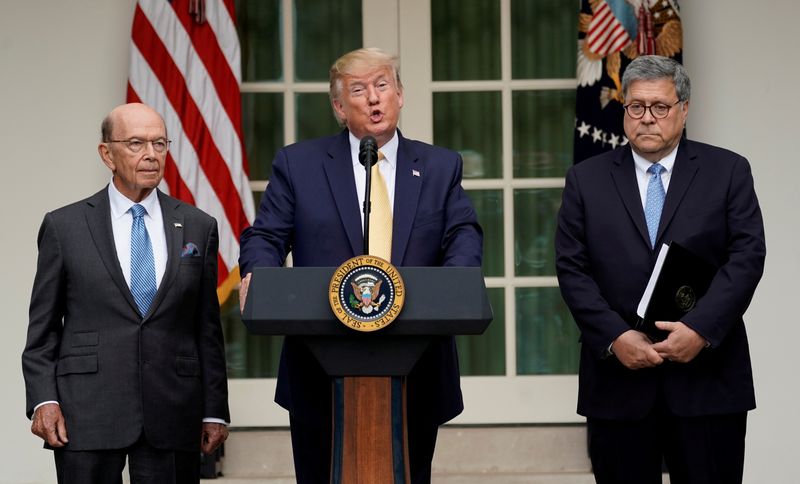By Nick Brown, Mica Rosenberg, Mimi Dwyer and Alexandra Alper
WASHINGTON/NEW YORK/LOS ANGELES (Reuters) - President Donald Trump signed a memorandum on Tuesday that would prevent migrants who are in the United States illegally from being counted when U.S. congressional voting districts are next redrawn, triggering swift rebukes from Democrats and threats of litigation.
U.S. census experts and lawyers say the action is legally dubious, and not easily executed in practice. Democratic-led states, including New York, and civil rights groups have already vowed to mount a legal challenge or said they are considering it.
If enacted, the plan could benefit Trump's Republican Party by eliminating the largely non-white population of migrants in the United States illegally, creating voting districts that skew more Caucasian.
It could also cause populous states with large immigrant contingents to lose seats in the 435-member U.S. House of Representatives, including big left-leaning states like California - currently with 53 seats - and New York, with 27.
The process of drawing voting maps for federal congressional districts is known as apportionment.
"Including these illegal aliens in the population of the state for the purpose of apportionment could result in the allocation of two or three more congressional seats than would otherwise be allocated," the memo said.
Redistricting, in which voting districts are redrawn to reflect changes in the population, is next slated for 2021, after the results of the 2020 U.S. census are in.
Each state will be given a share of the 435 congressional seats based on population. Historically, the distribution of seats has been based on total population, regardless of immigration status. Trump’s memo would exclude those not in the U.S. legally.
U.S. House of Representatives Speaker Nancy Pelosi, a Democrat, said in a statement the measure was "unlawful" and was "designed to again inject fear and distrust into vulnerable and traditionally undercounted communities, while sowing chaos with the Census."
'WHOLE NUMBER OF PERSONS'
From a legal standpoint, the move is far from a slam-dunk.
Proponents of citizens-only voting districts argue each vote should carry the same weight. If one district has far fewer eligible voters than another, they say, each vote there has more influence on election outcomes.
But while the U.S. Supreme Court has left the door open for citizen-based voting maps for state legislatures, experts see it as a long shot at the federal congressional level.
That is because the U.S. Constitution explicitly says congressional districts must be based on "the whole number of persons" in each district, as counted in each decennial U.S. census.
Dale Ho, an attorney with the American Civil Liberties Union, vowed litigation, saying in a statement, "We'll see him in court, and win," referring to the president.
New York Attorney General Letitia James, who helped lead a coalition of states that successfully challenged Trump's attempt to add a citizenship question to the census, made a similar threat.
"We will continue to lead this fight because we will not allow the Trump Administration’s anti-immigrant policies to tip the balance of power in the nation," she said in a statement.
The word "persons," Trump said in the memo, "has never been understood to include ... every individual physically present within a state's boundaries."
In fact it has, census experts say: Multiple federal laws have reinforced that apportionment must include everyone, and U.S. Supreme Court precedent has endorsed that view, said Joshua Geltzer, a constitutional law expert and professor at Georgetown Law.
'ANTI-GRAVITY'
Some see the order as mainly theater - especially because it is unclear how Trump would gather the data necessary to identify – and exclude – people in the United States illegally.
In 2019, the president signed an executive order calling on states to provide his administration with government records, such as driver's license databases, that could be used to determine the non-citizen population. The order is still facing litigation from immigration advocates.
Other surveys conducted by the U.S. Census Bureau provide estimates of the non-citizen population. But that data is incomplete and unreliable, demographers say.
"There is no count," said Justin Levitt, a professor at Loyola Law School, in Los Angeles, and former U.S. Department of Justice official under then-President Barack Obama, a Democrat.
"It's as if (Trump) has ordered the National Basketball Association commissioner to implement rules for the use of anti-gravity boots," Levitt said. "(The commissioner) says anti-gravity boots shall be permitted or shall not be permitted - but they don't exist."
Trump's memorandum could prove popular with the president's base as he tries to generate enthusiasm for his re-election in November, Levitt said.
Trump has spent much of his presidency seeking to limit the number of migrants who illegally enter the United States.

His past efforts to use the census to identify the number of undocumented immigrants have faced roadblocks, most notably in June 2019 when the Supreme Court rejected his attempt to add a citizenship question.